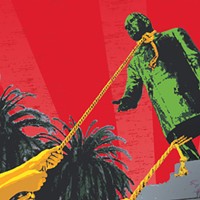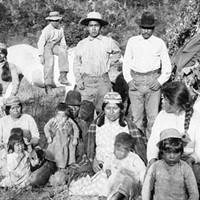The historical plaque recognizing the Jacoby Building in Arcata uses about 65 words in four sentences to inform visitors when it was built and by whom, when he sold it and a few of the functions it served over time. One of those sentences reads: "From 1858 through 1864 it served periodically as a refuge in time of Indian troubles."
An Arcata city councilman is quoted in the Dec. 7 Journal as saying, "I think the plaque is clearly totally racist and the words 'Indian troubles' is really just code for genocide and just a cover-up for everything that happened." Obviously, he would prefer that the shameless racists who commissioned the plaque had incorporated in it an essay describing the nature and causes of those "Indian troubles." How about casting onto a series of plaques the heartbreaking series of articles by Jerry Rohde that the NCJ has published over the years (Sept. 11, 2008, Feb. 25, 2010, and Oct. 27, 2016) concerning the historical treatment of local Native Americans. Revisionists could kill two birds with one stone by repurposing the bronze salvaged by melting down the McKinley statue.
The absurdity of demanding that markers identifying California historical landmarks should include essays explaining the harrowing details of how California was acquired in the first place approaches the silliness of the statement that "the plaque is clearly totally racist." Get a grip, councilman.
As to the statue, I don't have any opinions pro or con. When I first saw it upon moving up here in the 1980s, I found it rather comical: McKinley of all people? But Ms. Wear's article ("A Monumental Decision," Dec. 7) clarifies the significance at the time it was installed; the assassination of a president by a deranged anarchist was a genuinely alarming phenomenon and warranted sober commemoration and renewed respect for what we hoped was the American way of doing things. So the statue wasn't erected merely as a manner of lionizing a distinctly-less-than-leonine political figure.
The article indicates that removing it would cost a substantial amount. I suggest the city council solve this problem by opening a bank account with a local institution, inviting contributions from any citizens who consider this an issue and, when the accumulated balance matches the then-current estimated costs of removal, go for it. But certainly not out of city coffers.
As to The General, I was surprised to come to the realization that the problem around the Buster Keaton classic is neither silly nor trivial. I love the movie, have seen it several times and eventually bought a copy of it on tape. I was in perfect agreement with Marcy Burstiner's enthusiastic column ("The General Concerns," Nov. 2).
And we're not alone in our enthusiasm: The Wikipedia entry on Keaton observes, "Among [the film's] strongest admirers was Orson Welles, who stated that The General was cinema's highest achievement in comedy, and perhaps the greatest film ever made." So, not surprisingly, I concurred with Ellen Taylor's letter the next week (Mailbox, Nov. 9) that "unhinged" would be a fair description of requiring a teacher to apologize for presenting it.
But the next issue (Mailbox, Nov. 16) carried an explanation by Michael Moore, Jr., describing his experience of the film from an African American perspective. He sees it as clearly and primarily a celebration of the Confederacy and describes it as part of "a tactic to keep African Americans in fear and out of power," and characterizes the showing as having "a teacher encouraging the crowd to cheer for the Confederacy." He closes: "... it was weird to have a room of mostly white people cheering for the side that fought to keep my ancestors in chains."
What could I ever say that might enable him to experience that what I'm cheering for is that plucky, resourceful, indefatigable little deadpan guy overcoming everything the slings and arrows of outrageous fortune can throw at him? If Keaton had been playing a Martian overcoming bad breaks and pesky homo sapiens with the same elan and ingenuity, I'd have been rooting for his character with the same enthusiasm. But Mr. Moore has clearly made the point that, depending on a person's own individual experience, he or she would not have to be "unhinged" to take offense in the circumstances as he experienced them.
When I was in high school, George Orwell's new dystopian novel 1984 was making the rounds. As I recall, the protagonist, Winston Smith, was employed by the Ministry of Truth, the function of which was to edit all history and news continuously so as to destroy the reality — indeed, the concept — of a past that could be in conflict with the government's current official position. As the government put it: "Who controls the past, controls the future. Who controls the present controls the past."
My vote? Historical accuracy to the extent possible, please; faddish iconoclasm, no thanks.
Mark Drake is a longtime Journal reader who lives in Fortuna.
Have something you want to get off your chest? Think you can help guide and inform public discourse? Then the North Coast Journal wants to hear from you. Contact us at [email protected] to pitch your column ideas.





Comments